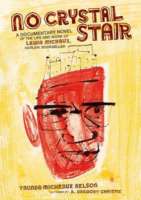
No Crystal Stair
Written by Vaunda Micheaux Nelson
Carolrhoda Books, 2012, pp. 208
ISBN-10-0761361693
“If a man don’t know where he’s come from, he don’t know where he’s going. If you don’t know what you’re worth, you don’t know what to charge for your labor” (p.39).
Lewis Micheaux was a bright child who saw his own worth during a time when Black folks were expected to be acquiescent to the dominant White power structures. He was quick both socially and intellectually, and thus had problems living in his home community. Migrating to Pennsylvania and then New York as a young man, Lewis Micheaux became the owner of the National Memorial African Bookstore, the most influential bookstore in Harlem during the 20th century. Selling only books by Black authors and for a predominantly Black audience, Lewis fell under investigation by government forces while also an initial entity of scrutiny to the Black community. Micheaux challenged the location of Blacks as “Negroes,” suggesting that such a term was disempowering and disenfranchising. While novelized to fill in some of the gaps in the story, No Crystal Stair (from the poem, “Mother to Son,” by Langston Hughes) addresses issues of race and class in a direct and engaging manner that creates spaces for discussion by both young adults and their teachers. It is an excellent text to use with young adults as the narrative puts a face on the timeless issue of racism in America.
Realistic, oft-times humorous, and deeply thought-provoking, No Crystal Stair is a fictionalized documentary that presents not only an ingenious man, but the historical time period prior to and including the Civil Rights movement in the United States. Questions about the living conditions, treatment, and equal opportunity of African Americans within the USA both during and post 20th century would be expected by readers regardless of age, and the opportunity for readers to explore the long legacy of racism that is still present in institutions as well as individuals today. This text would make a great pairing with books such as Invisible Man (Ralph Ellison, 1995; 2007) and The Chaneysville Incident (David Bradley, 1990) if working with older adolescents, and texts about Jim Crow, the Civil Rights movement, or the Harlem Renaissance for younger adolescents. Good companions would include Harlem Stomp! A Cultural History of the Harlem Renaisssance (Laban Carrick Hill, 2009); Getting away with Murder (Chris Crowe, 2003), and Students on Strike: Jim Crow, Civil Rights, Brown, and Me (John A. Stokes, 2007).
No Crystal Stair addresses themes of knowing one’s identity, the blight of racial injustice, and the importance of economic, emotional, and racial freedom in a democratic society. Issues as timely now as they were during Lewis Micheaux’s lifetime, No Crystal Stair is an engrossing and stark reminder of U.S. history that boldly rebuts the mythology of freedom and equality often touted in textbooks and around mainstream dinner tables. This fictionalized documentary creates a space for discussing the triumph of Micheaux’s life and work and their effect on our history as a nation. This book is as remarkable as the man.
Vaunda Micheaux Nelson is the granddaughter of Lewis Micheaux. She is an author of a number of books for young people, including the picture book, Bad News for Outlaws: The Remarkable Life of Bass Reeves, Deputy US Marshall (2009). She did extensive research for this text but also needed to fill in some of the details of his life that eluded documentation. More information about Ms. Micheaux Nelson can be found at the Adams literary website and the website entitled The Brown Bookshelf.
Holly Johnson, University of Cincinnati, Cincinnati, OH
WOW Review, Volume V, Issue 1 by Worlds of Words is licensed under a Creative Commons Attribution-NonCommercial-ShareAlike 4.0 International License. Based on work at https://wowlit.org/on-line-publications/review/v-1/

Thank you, Judi Moreillon, for this wonderful and thorough review.
I appreciate the connection to other books about the effects of war on children and hope, as more titles with international settings are published, young US readers’ perspective and understanding of world events continues to deepen.
Interested teachers can find a discussion guide for MY BROTHER’S SHADOW on the publisher’s website that includes a bibliography of WWI titles. http://media.us.macmillan.com/discussionguides/9780374351229DG.pdf
For teachers, students and ‘history nerds’ with an interest in primary sources I would like to recommend the website of the German History Institute in Washington, D.C.. Their digital library links to documents, images, etc., sorted by time periods, with translations and captions in English. http://germanhistorydocs.ghi-dc.org/